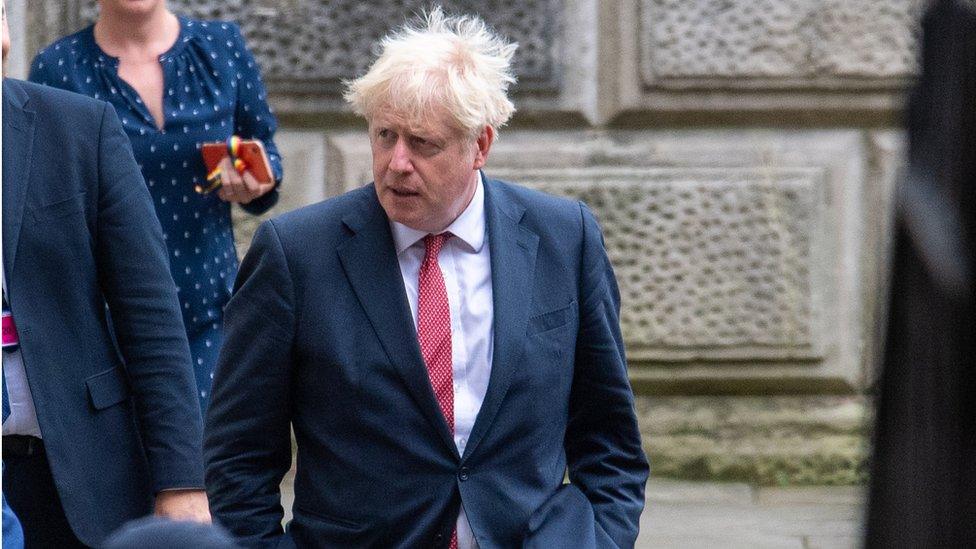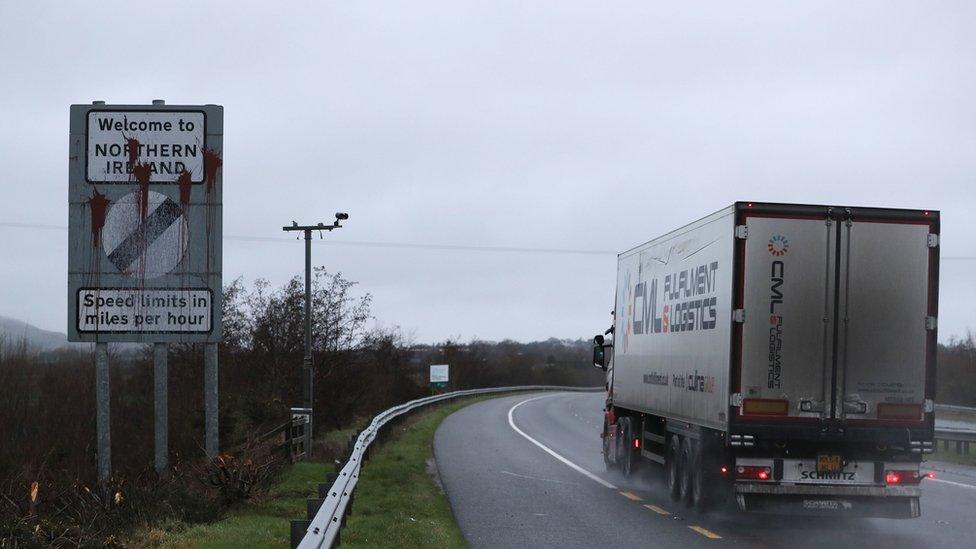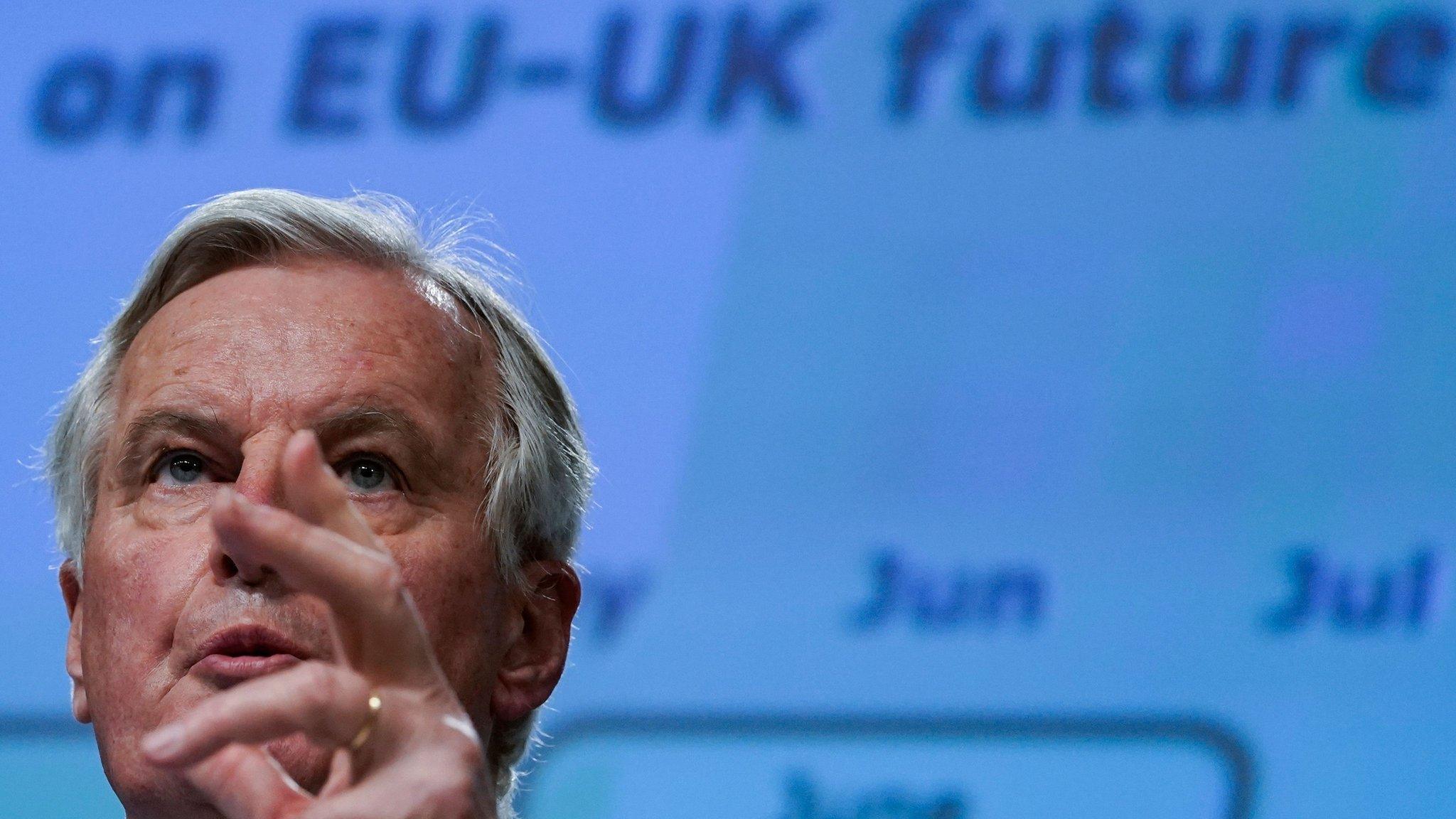Brexit is back - and likely to get louder
- Published

What is going on?
You might have thought that you had escaped any more conversation or political argy-bargy about Brexit.
We have left the EU after all. And it's not as if the political establishment hasn't spent enough time tearing itself apart over the subject.
The trade talks have been rumbling on, albeit not that successfully. But surely, a few hundred pages signed and sealed last year, and an election dominated by the issue meant the worst of it was done?
Not necessarily. Autumn irritations are back, and on more than one Brexit front.
First off and most straightforwardly, the trade talks, due to get going again in London tomorrow, are in trouble.
While one diplomat told me today there's a "haggle" there to be done on the tricky issue over fishing, the two sides seem to be stuck on the question of how much the UK government wants to support its domestic industries.
In short, (I promise) the UK wants the ability to support companies who might be in trouble but who are vital to the national interest.
And, more enticingly to this particular Downing Street tribe, they want the possibility of putting taxpayer-funded rocket boosters under tech companies or fledgling industries that could be extremely important to the future.
But if the EU is going to do a decent trade deal with the UK, they want to know their companies wouldn't have a hard time competing with British businesses who were being propped up with huge chunks of public cash.
Right now, the UK doesn't want to reveal exactly how it will police so-called "state aid" in future.
And the EU won't play until they know the score. So far, so stuck. If neither side is prepared to budge in this area then it's hard to see how there can be an agreement.
So there are still tensions over the future trade deal which will in theory replace the UK's membership of the single market and the customs union - which have continued in practice during the 11-month transition period which runs out at the end of this year.
But there is also a clash about what exactly was agreed in the past.

Chief EU negotiator Michel Barnier has said a legal text needs to be agreed by the end of October
Even occasional readers here (and welcome back after the summer!) will remember the protracted difficulties over avoiding a hard border between Northern Ireland and Ireland.
The arrangement that was struck to satisfy the political desires on both sides to do a deal was the Northern Irish protocol, which created special arrangements.
The protocol was elegantly drafted enough, or had just the right amount of fudge, for it to be accepted by both sides, not withstanding it ended the grim political romance between the Tories and the DUP.
Inherent contradiction
But like many international deals that are concluded because the political will makes it possible, when they are about to come into force real-life problems arrive.
The protocol said that Northern Ireland would officially be in the UK customs territory.
But to keep its 310-mile open border with EU member Ireland, it would still have to follow some of the EU customs code. It doesn't take a genius to spot the inherent contradiction right there.
In the UK, but under some of the EU's rules. And there was no tight legal definition of "unfettered access" for trade between Northern Ireland and the rest of the UK that was promised alongside.
Since the deal was passed, a so-called Joint Committee has been trying to work out how the dry language of the deal will work in practice.
In keeping with Brexit tradition, that has not been a process without problems.
Confused by Brexit jargon? Reality Check unpacks the basics.
Last night, a report in the Financial Times that ministers were plotting to in effect rewrite parts of the hard-won protocol provoked a quick and pretty outraged response from many quarters.
Government sources accepted initially that plans coming in the UK Internal Market Bill on Wednesday would "override" some of the existing provisions of the protocol.
It seemed initially that they were somewhat relaxed about the possibility of an audacious and highly risky move being out there, which would inevitably provoke EU outrage.
But, by this morning, ministers were adamant they weren't going to tear up the protocol at all, merely they planned to tidy up some of the provisions, and sew up a few "loose ends".
In such a contentious area, any unfinished business could explode into a major political disagreement.
Question of control
Only when we see the actual black and white in the bill on Wednesday will it be completely clear how controversial that "tidying up" will be.
But it's clear that ministers want to try to define the UK's interpretation of the Irish protocol as tightly as they can in UK law, rather than waiting for the conclusions of the troubled joint approach.
Funnily enough, that would give more control to Westminster rather than shared between the two sides.
The government seems set on giving ministers more power to decide what would possibly be subject to duties or taxes, and give ministers more say over the definition of state aid, if a joint agreement can't be reached.
Yet the wording of the legislation will be crucial and carefully watched on the other side of the Channel.
It's perfectly likely that the bill when it emerges contains other plans that are more controversial still, not least in how it sets out the post-Brexit relationships between Westminster, Holyrood, Cardiff and Belfast too.
This process is technically separate to the trade talks. But across the board, there's a toughening stance from the UK as the clock runs down.
Just as the story about the protocol emerged, so too did a tough statement from the prime minister giving the talks only another five weeks to make progress or be pointless carrying on.
That was only a day after the UK's chief negotiator, Lord Frost, issued a similar call in a Sunday newspaper warning, as the PM regularly has, that the UK would rather forgo a deal than back down.
Those kind of warnings and threats are welcomed by many of the government's supporters, of course. The UK didn't vote to leave the EU only to be tangled up in its mechanisms for ever.

The UK signed up to the Northern Ireland protocol as part of its Brexit deal last year
And beyond all the talk, there is a genuine frustration in government that the EU is yet to treat the UK as if it were a fully sovereign country. That's matched on the EU side by similar irritation that the UK won't budge.
But the bad tempers do not necessarily mean that a deal won't be reached. And all the blood curdling vows don't mean that in the end there won't be compromise.
There are loud echoes of autumn last year. Each day it seemed Downing Street raised the temperature, by October even briefing that a deal was "essentially impossible".
Less than a fortnight later, the divorce deal had been done. The prime minister had decided to give enough ground to sign. The EU conceded they would move too to get the agreement over the line.
Surely, (whisper it), it might not even suit politicians to crank up the pressure to play to their different audiences from time to time?
It is true that the government wants a trade deal to be struck so that it's easier for businesses to work with and around the EU come January, when we leave the single market and customs union.
Tough talk
But it is also true that Boris Johnson does not want to give much ground.
And in both cases it could rather suit ministers to have been toughening their position, and shouting ever louder about the risks.
If the talks collapse and the two sides fail to reach agreement, even if that means significant economic disruption, no one could say that the government had not made that possibility clear, even if their detractors blame them for the fallout.
And if the talks succeed in the end, ministers have perhaps created something of an impression that it's all their tough talk that has won the day, even if in reality, they have backed down.
The arguments over our relationship with the EU are likely to get a lot noisier before they conclude.
- Published27 February 2020

